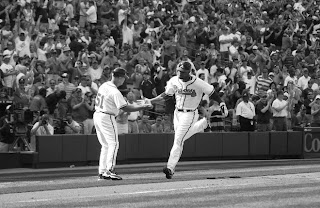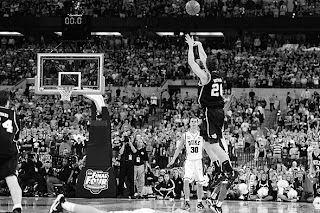Sure, we put up with plenty of boring games where nothing particularly incredible happens, but every so often, one of them is so good that you would have thought it was too unrealistic had it been written, acted and played out for you in a movie theater. On the opposite end of the continuum, once in a while you watch something so close to perfect almost happen and wish that someone had the power to go back and change the script.

With 13 seconds left on the clock in and Butler trailing by one point, Hayward started at the top of the key and began driving towards the basket, dribbling to the right. With about 6 ticks remaining, he planted his feet and pushed off parallel to the baseline, and lifted a high, soft 12 foot fadeaway. It wasn't a high percentage shot, but Hayward make a crisp release. As it began to descend from its apex, the ball was still perfectly on line with the hoop. However, it struck the inside of the back of the rim and ricocheted directly back towards the spot that Hayward took off from.

Yesterday, two 20 year old kids with homophonic last names found themselves on opposite ends of that spectrum.
This spring, the front office of the Atlanta Braves decided that über-rookie Jason Heyward was so good, they couldn't afford to stall his arbitration clock by keeping him in the minors to begin the season. They may have sacrificed a year of team control and millions of dollars in the process because of it, but the phenom broke camp with the Big League club.
Yesterday afternoon in Atlanta, Heyward stepped in the box against the Cubs' Carlos Zambrano for his first Major League plate appearance. With his parents in the stands and the crowd chanting his name in between pitches, the level of excitement in Turner Field was tangible. The game was being broadcast on ESPN2, so plenty of eyes around the baseball world were focused in on the at bat.

Heyward took two 4-seam fastballs high for balls before connecting with a two-seamer low in the zone. The ball exploded off the bat and carried deep into the Braves bullpen in right field, good for a three run homer that put the Braves up 6-3. There was little doubt throughout the baseball community that Heyward was going to be a useful player right out of the gate, but as it so rarely does, the hype was justified immediately. It's not to say that this guarantees Heyward is going to have a great career, but that the fans in Atlanta didn't need to wait to see a glimpse of his considerable potential. Sometimes suspense is thrilling, but in this case it was the lack thereof that created the drama.
About 8 hours after Heyward's fairytale beginning, the best player on the Butler Bulldogs, Gordon Hayward, looked to complete a storybook ending to what was already a fantastic National Championship in his hometown of Indianapolis. It was one of just four times that the title game had taken place in the city that one of the schools called home and improbably, Bulter was keeping pace with Duke.
Hayward had struggled throughout the night, shooting just 2-9 from the floor in front of a very vocal and supportive crowd, but the Bulldogs hung in there. The game was neck and neck for the entire 40 minutes; the difference between the two teams never greater than 6 points. Since the battle was so tight, the end of it wasn't broken up by copious amounts of timeouts taken and fouls committed by a team trying to fight its way back into it.
With 13 seconds left on the clock in and Butler trailing by one point, Hayward started at the top of the key and began driving towards the basket, dribbling to the right. With about 6 ticks remaining, he planted his feet and pushed off parallel to the baseline, and lifted a high, soft 12 foot fadeaway. It wasn't a high percentage shot, but Hayward make a crisp release. As it began to descend from its apex, the ball was still perfectly on line with the hoop. However, it struck the inside of the back of the rim and ricocheted directly back towards the spot that Hayward took off from.

If the ball had carried just an inch less, Duke would have been down one with about five seconds to go. Instead, Duke's center Brian Zoubek pulled down the rebound and was fouled immediately, sending him to the free throw line with 3.6 seconds left. He made the first and after intentionally missing the second, the ball fell into Hayward's hands once again. The baby-faced sophomore only had time for a few dribbles and released the ball from half court just as the clock was expiring. It hit the backboard, deflected off the near side of the rim and fell to the ground as Duke became the National Champions.
Hayward came impossibly close, twice, to winning the game for a school that only shameless homer and alumni would have picked to be in the Final Four, let alone the Championship Game. The difference between those two shots going in or bouncing out is so small that no human being, no matter how skilled, could expect to control it. Concerning the last shot in particular, the disparity between hitting one of the greatest buzzer-beaters on the biggest stage possible in college basketball and going home empty-handed was the way that his neurons and synapses subconsciously fired over the course over several milliseconds.
Right or wrong, that's what we remember. We distill sports down to their most incredible moments, but don't often bother to think about the alternate outcomes and how close - literally fractions of an inch and hundredths of a second - they came to occurring.
Gordon Hayward is just a sophomore at Butler, so if he chooses, this doesn't have to be the end of his college career. But the odds against him leading a team that far into the NCAA Tournament let alone coming just thatclose to winning it are so long that they might as well not exist. Jason Heyward is likely just at the beginning of a long and successful career, but 5, 10, 20, 50 years from now, both of these athletes are going to be able to recall those two remarkable moments in incredible detail. Only one of them is going to bother to wonder what might have happened if it had turned out another way.






Great stuff, Jay, especially about the fickle fractions in sports and how they sculpt our historical memories. Heyward's blast was poignant as well as profound. What kind of day is that? The guy gets to catch the first pitch on Opening Day from one of the very greatest of all time in Hammerin' Hank, then clubs a monstrous blast to right in his first MLB at-bat. King for a day, at least.
ReplyDeleteHayward and the rest of the Bulldogs were game and gritty in defeat, and Butler is indeed legit. Izzo was right--Butler is no Cinderella; they're Grade A, and it's just a matter of time before one of the mid-major schools (which typically have kids stay longer therefore allowing them to mature as players and people, as well as solid if underrated coaches) wins it all.
(Two slightly persnickety points on the hoops championship: Hayward just finished his sophomore year, and there was a six-point spread at one point, 26-20 Duke, right before Butler rattled off 7 straight after a well-called timeout.)
Thanks a lot Jason. Catching the first pitch from Aaron is pretty awesome and if Heyward goes on to have an excellent career that will be a cool footnote to the day.
ReplyDeleteAgree about the increasing legitimacy of the mid-majors. They have to hope that they can collect and develop a lot of talent at the right time and make a run, not unlike small market teams like the Rays in baseball.
Fixed both of those errors. Appreciate the catches.